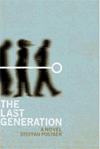A parable for the malcontents in Adland…
October 2, 2018

Before I was offered a new job, I visited a lot of agencies. Typically, I met with people representing the management team. It was a gauntlet. But I always expected a positive reception, from both the interviewers and myself. However, that was not always the case. At one agency, a number of the folks I met were down on their company and told me so. There were politics. There was unfairness. Dead weight permeated the company. One interviewer asked: “Steffan, do you know what you’re getting yourself into?”
Sad but true.
Complaining is common in Adland. Granted, usually not as part of a first impression but typical nevertheless. It’s not a good look. Seldom is it useful. Startled, I told the above-mentioned complainer a parable, the best thing I could think of at the time. Here is part of it:
Every day a group of men set out to forage in the desert by their village. They ventured far in order to get to the forest and its abundance of resources. At the half way point of their journey was a lone, large tree in which they took a break to rest and eat lunch. “A shame this tree,” one man said. “It has no fruit for eating.” The others agreed. “And its wood isn’t suitable for building either…”
And so on they complained. What the complainers failed to realize was the great benefit the tree provided. In fact, the old tree was a refuge. Seemingly barren, it provided shelter from the noonday sun without which their journey would have been infinitely more treacherous. This critical benefit was lost on the men. As was the unity this resting place fostered among the travelers. All was taken for granted to spite the obvious.
I recall a company meeting at a previous place of employment, a long time ago. We’d had a tough year. Morale was low. The employees were skeptical about their agency’s future. Many used the setting as a forum to voice their complaints: Management was inept, they cried. Our clients are bound to mediocrity. Woe is us!
During my turn to speak I told the story about the old tree. Our agency was beleaguered but I wanted us to appreciate all that we had: jobs, community and a place to voice our grievances freely and without fear of reparations.
In some respect I was talking to myself. Though I harbored many of my fellow’s misgivings I wanted healing words. Not apathetic ones. We’d had plenty of those already. Change was needed. And change would come. But on that day I needed gratitude. We all did. I worked for one of the greatest advertising agencies in the world. It had been hobbled but it was still there. Despite our weakened position, so were we.
Author’s note: I published a version of this story some time ago, while I was looking for my next job. Having found one, I am filled with gratitude. Here’s to never forgetting what matters…
More input & less output: Have slick talkers taken over Adland and made it their bitch?
May 21, 2018

Recently, I read an essay from an anonymous copywriter that struck a chord. I did not save the link (my bad) but the gist of his/her argument was that within marketing services companies far too many big talkers are achieving way more success than they deserve and, moreover, they are effectively degrading the profession (even more so). The author observed how smooth talking, jargon-dropping, critical thinkers have become so prevalent and dominant in our industry that we’ve become a business of talkers not doers, endlessly revising briefs and tweaking PPT’s instead of producing actual work. We are making many meetings but few campaigns. This, of course, suits the talkers who, by endlessly analyzing and criticizing, continue to bake in more process.
Are we having fun yet?
It goes without saying that these machinations are antithetical to the flow of any decent agency and the creative department in particular. Yet, before we go off and blame the strategists for all this hot air, it’s only fair to point out slick talkers and their myriad sins have plagued Adland since before the Mad Men era. Then, it was the evil account guy. Only interested in pleasing clients, he made lives miserable for countless sensitive creatives. “It ain’t right yet. We need another round.”
That said, at least back then agencies produced work. And lots of it. So much so there were actual production departments. Now many agencies don’t even have a producer on payroll, let alone a department, opting instead to bring in the occasional freelancer for the role or, more typically, relegating the job to hardscrabble project managers. So much is hypothetical. Recycling stock. Fodder.
According to Anonymous it is indeed “strategy gone wild.” The pandemic of verbal diarrhea is especially acute in the technology and B2B arenas, where strategists often define the marketing department. As new platforms and complicated algorithms take over Adland, the talking will only get louder.
Sadly, it seems many clients would rather pay for barbless strategery versus actually fishing. And so we keep tying and retying flies. Red feather. Yellow feather. No feathers. Two. Maybe try spinning gear? For Christ’s sake put a line in the water! This vicious cycle hurts everyone caught in its sucking funnel. Except for the big talkers. Under guise of “getting it right” they have become manifest, perpetuating their self-made roles as agency gatekeepers.
This piece originally ran week prior in Reel Chicago I am available for writing projects
Ad agencies, be careful what you wish for. The big client can also be the “Big C.”
September 3, 2015
It’s only a metaphor… It’s only a metaphor…
I don’t know if every agency has this double-edged sword slicing through it but every one I’ve ever worked for has. I’m talking about one conspicuously large client that takes up as much space as all the others put together. Obviously, this “problem” has its upside. Namely billings. Giant clients bring agencies money. And, well, the importance of that cannot be underestimated.
Ironically, it is often underestimated. Budgets have a way of shrinking. Like any client big ones change their mind. First quarter projections are seldom realized. Half way through the fiscal year agencies are typically chasing a number. It’s never quite what it once seemed. Sometimes it isn’t even close.
In theory, big clients provide numerous big creative opportunities. But that has not been my experience. Why? Big clients are big companies. And big companies are layered, rife with politics. Marketing is no exception. Indeed, it is often the department most challenged by bureaucracy. Marketing is divided into silos. Each silo has a group head. He reports to a marketing director, who, in turn reports to the CMO. The CMO must deliver results to the CEO. The CEO is beholden to her shareholders. Getting work in front of him or her who matters is a merciless gauntlet. Risk aversion is the result. Decisions are made by committee if they are made at all. Really smart people become less so. Fear permeates these ecosystems, obvious as algae on coral. In these conditions, saying “no” becomes the easiest option. This translates into endless, futile presentations, where your audience is mostly worried about what his many superiors will think. Kicking the can is what happens. And that can is creative.
Alas, this is only the tip. Monoliths dominate an agency, changing it, dividing it. There are those who service the big client… and everyone else. A house divided takes its toll on everyone. Resentments develop between sides. The money is over here but the creative opportunities are over there. Some staff work harder than others, logging grueling hours on thankless tasks. When certain individuals get to go home for dinner and others never do, it’s patently unfair. Or the opposite happens. Those not working on the “important” client feel left out, less than. Rightly or wrongly, they may wonder why no one in management cares about what they’re doing. Perception is reality and the perception ain’t good.
The ‘us and them’ scenario is very common in Adland but that doesn’t make it okay. Agency culture, the thing so many of us like to wag about, becomes agency dysfunction. Often the two sides separate, forming agencies within agencies. This works until it doesn’t. Before you know it these kingdoms grow weary of sharing resources. The strong tire of helping the weak. The poor turn bitter from subservience. I give you Game of Thrones.
While the holding company model is often rightly criticized for this very thing I’m saying it can and does happen at any agency, regardless of affiliation. The whale –a dream come true for every agency- can quickly become a nightmare.
What’s the solution? I can assure you it isn’t rejecting big clients. Having been through the looking glass numerous times, I can only offer these suggestions. If camps are inevitable do not allow fences to go up. Smash them wherever you see them. Be open about what is happening but refrain from judgment or cynicism. Rather, think about what the other is going through. Appreciate their value even if you question it. This goes for everyone in the company. Newer recruits must respect the complexities of management and management must remain sensitive to what everyone in the company is experiencing. Easier said than done. But trying to remain right sized in an unbalanced boat is paramount to staying afloat.
It’s only a metaphor… It’s only a metaphor…
I don’t know if every agency has this double-edged sword slicing through it but every one I’ve ever worked for has. I’m talking about one conspicuously large client that takes up as much space as all the others put together. Obviously, this “problem” has its upside. Namely billings. Giant clients bring agencies money. And, well, the importance of that cannot be underestimated.
Ironically, it is often underestimated. Budgets have a way of shrinking. Like any client big ones change their mind. First quarter projections are seldom realized. Half way through the fiscal year agencies are typically chasing a number. It’s never quite what it once seemed. Sometimes it isn’t even close.
In theory, big clients provide numerous big creative opportunities. But that has not been my experience. Why? Big clients are big companies. And big companies are layered, rife with politics. Marketing is no exception. Indeed, it is often the department most challenged by bureaucracy. Marketing is divided into silos. Each silo has a group head. He reports to a marketing director, who, in turn reports to the CMO. The CMO must deliver results to the CEO. The CEO is beholden to her shareholders. Getting work in front of him or her who matters is a merciless gauntlet. Risk aversion is the result. Decisions are made by committee if they are made at all. Really smart people become less so. Fear permeates these ecosystems, obvious as algae on coral. In these conditions, saying “no” becomes the easiest option. This translates into endless, futile presentations, where your audience is mostly worried about what his many superiors will think. Kicking the can is what happens. And that can is creative.
Alas, this is only the tip. Monoliths dominate an agency, changing it, dividing it. There are those who service the big client… and everyone else. A house divided takes its toll on everyone. Resentments develop between sides. The money is over here but the creative opportunities are over there. Some staff work harder than others, logging grueling hours on thankless tasks. When certain individuals get to go home for dinner and others never do, it’s patently unfair. Or the opposite happens. Those not working on the “important” client feel left out, less than. Rightly or wrongly, they may wonder why no one in management cares about what they’re doing. Perception is reality and the perception ain’t good.
The ‘us and them’ scenario is very common in Adland but that doesn’t make it okay. Agency culture, the thing so many of us like to wag about, becomes agency dysfunction. Often the two sides separate, forming agencies within agencies. This works until it doesn’t. Before you know it these kingdoms grow weary of sharing resources. The strong tire of helping the weak. The poor turn bitter from subservience. I give you Game of Thrones.
While the holding company model is often rightly criticized for this very thing I’m saying it can and does happen at any agency, regardless of affiliation. The whale –a dream come true for every agency- can quickly become a nightmare.
What’s the solution? I can assure you it isn’t rejecting big clients. Having been through the looking glass numerous times, I can only offer these suggestions. If camps are inevitable do not allow fences to go up. Smash them wherever you see them. Be open about what is happening but refrain from judgment or cynicism. Rather, think about what the other is going through. Appreciate their value even if you question it. This goes for everyone in the company. Newer recruits must respect the complexities of management and management must remain sensitive to what everyone in the company is experiencing. Easier said than done. But trying to remain right sized in an unbalanced boat is paramount to staying afloat.
Helping a sister agency within your network is a double-edged sword if ever there was one. In theory the helper gets the benefit of participating in important national or global business, which can mean lucrative assignments with blue chip clients as well as face time with your company’s top management. In theory…
The reality is often far less lucrative for the helper. For one thing, the help you provide is speculative. Aka unpaid. If they/you lose the pitch it stays that way, which actually is a loss, given whatever hours (usually plenty) your office sunk into it.
To encourage participation, agency brass generally promise and always imply that should the network win its engagement a fair share of the revenue will come your way. In my lengthy experience of helping –and, yes, also soliciting help- this rarely happens. With few exceptions, the soliciting office keeps the money, makes the work and holds all the key relationships.
And that’s the winning scenario!
But I’m getting ahead of myself. Before any verdict is rendered a shit-ton of work must be produced, the bigger the stakes the more work that is required. There are other reasons for soliciting help from a network partner (geography, skill sets, etc.) but it almost always comes down to increasing the breadth and depth of your agency’s response.
The only person who has the juice to request (aka commandeer) another office’s resources is the network’s CEO, (though the actual request may come from one of his lieutenants, perhaps the CMO or Head of Strategy.)

“More resources…or I will release the hounds!”
Answering the dinner bell is is what constitutes your “face time” with top management. While this experience has genuine value, it is also far more one sided than you’d like. Trust me. Command central is only interested in winning. Once they’ve drafted you they are only concerned with your output. Not your opinion. Not your participation. Most certainly not your emotional health.
This means what you think it does. You are building a pyramid for Pharaoh. When “feedback” for your efforts does come, it will be a litany of change orders delivered by a fear driven messenger. He will smile and listen to you vent. It will change nothing. Therefore, any illusion you may have regarding a dialog with He Who Wears The Crown needs to be forgotten. Building a pyramid demands heavy lifting and your office can either do so angrily or stoically. It makes no difference to Pharaoh. Either way, you’re gonna do it.
All this being, said I’ve never declined giving help no matter the circumstances. And my guess is neither will you. Look. People are intrinsically good, even ad people. We are wired to provide assistance. We may fancy ourselves as solo creators but we also want to play for a winning team. What’s good for the goose, right? Yes, they will cry wolf once too often. Yes, you’ll be mortgaging your time on a loan that might never get repaid. And yes you will want to kill someone in the home office. But then you will get back to work. We always do.






 The Happy Soul Industry
The Happy Soul Industry The Last Generation
The Last Generation